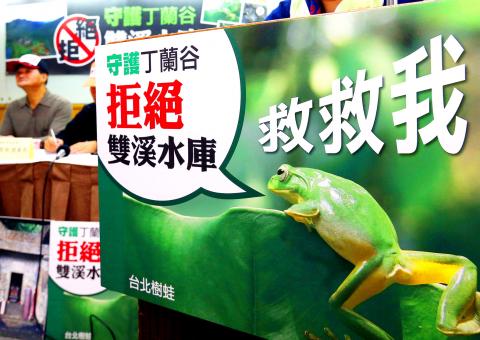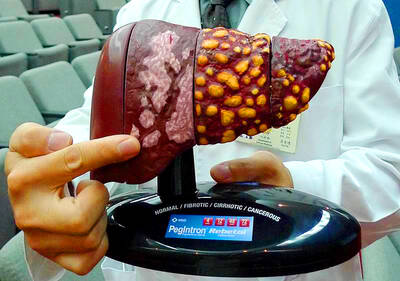Dozens of residents of New Taipei City’s Shuangsi District (雙溪) yesterday called on the government to cancel construction of the Shuangsi Reservoir (雙溪水庫), saying that it should instead focus on managing rich water resources in the nation’s northeast.
The Environmental Protection Administration (EPA) in 1996 announced that the reservoir construction project would undergo a second-stage environmental impact assessment.
However, due to local residents’ strong opposition, the project’s developer, the Water Resources Agency, did not begin the EPA’s subsequent review procedure until 2013, when the EPA required the agency to submit more analyses about water storage and rainwater recycling.

Photo: CNA
The project has become part of the government’s Forward-looking Infrastructure Development Program, which launched this year.
The Shuangsi Reservoir would solve the water shortage problem in the northeast, where Keelung’s Sinshan Reservoir (新山水庫) and Sishih Reservoir (西勢水庫) are unable to supply adjacent areas with sufficient water, the agency said.
According to the agency’s plan, the Shuangsi Reservoir would draw water from the Dingzihlan River (丁子蘭溪) in Shuangsi and would have a storage capacity of 17 million cubic meters.
At a news conference in Taipei yesterday, local residents and environmentalists questioned the necessity of the project.
Instead of building a reservoir that would cost about NT$12 billion (US$400 million), the government should prioritize water storage and pipe leakage prevention efforts, local resident Lin Tseng Wen-yan (林曾文彥) said, adding that the local tap water system leaks about 30 percent of its water.
The government should promote rainwater collection and complete the construction of sewage disposal systems in Shuangsi, Pingsi (平溪), Gongliao (貢寮) and Rueifang (瑞芳) districts, Keelung River Protection Alliance convener Chen Chien-chih (陳建志) said, adding that the reservoir project might only benefit a few people in civil engineering circles.
Water shortage is only an excuse, otherwise the project would not have been postponed for about 20 years, Environmental Rights Foundation lawyer Chen Hsien-cheng (陳憲政) said.
The analyses required by the EPA’s Environmental Impact Assessment Committee in 1996 are now outdated, Chen Hsien-cheng said, adding that the agency should employ cutting-edge hydraulic engineering techniques to improve the local water supply system.
The Dingzihlan River basin is home to many protected species, such as Swinhoe’s pheasant and the emerald-green tree frog, Chinese Wild Bird Federation member Lu Yi-wei (呂翊維) said, adding that the government should not sacrifice wildlife habitats for a small reservoir.
The committee is to conduct a field examination on the planned site and hold a public hearing in Shuangsi on Friday next week.

The Taipei Summer Festival is to begin tomorrow at Dadaocheng Wharf (大稻埕), featuring four themed firework shows and five live music performances throughout the month, the Taipei Department of Information and Tourism said today. The festival in the city’s Datong District (大同) is to run until Aug. 30, holding firework displays on Wednesdays and the final Saturday of the event. The first show is scheduled for tomorrow, followed by Aug. 13, 20 and 30. To celebrate the 30th anniversary of Disney Pixar's movie Toy Story, the festival has partnered with Walt Disney Co (Taiwan) to host a special themed area on

BE CAREFUL: The virus rarely causes severe illness or death, but newborns, older people and those with medical conditions are at risk of more severe illness As more than 7,000 cases of chikungunya fever have been reported in China’s Guangdong Province this year, including 2,892 new cases last week, the Centers for Disease Control (CDC) yesterday said it is monitoring the situation and considering raising the travel notice level, which might be announced today. The CDC issued a level 1 travel notice, or “watch,” for Guangdong Province on July 22, citing an outbreak in Foshan, a manufacturing hub in the south of the province, that was reported early last month. Between July 27 and Saturday, the province reported 2,892 new cases of chikungunya, reaching a total of 7,716

STAY VIGILANT: People should reduce the risk of chronic liver inflammation by avoiding excessive alcohol consumption, smoking and eating pickled foods, the physician said A doctor last week urged people to look for five key warning signs of acute liver failure after popular producer-turned-entertainer Shen Yu-lin (沈玉琳) was reportedly admitted to an intensive care unit for fulminant hepatitis. Fulminant hepatitis is the rapid and massive death of liver cells, impairing the organ’s detoxification, metabolic, protein synthesis and bile production functions, which if left untreated has a mortality rate as high as 80 percent, according to the Web site of Advancing Clinical Treatment of Liver Disease, an international organization focused on liver disease prevention and treatment. People with hepatitis B or C are at higher risk of

Aftershocks from a magnitude 6.2 earthquake that struck off Yilan County at 3:45pm yesterday could reach a magnitude of 5 to 5.5, the Central Weather Administration (CWA) said. Seismological Center technical officer Chiu Chun-ta (邱俊達) told a news conference that the epicenter of the temblor was more than 100km from Taiwan. Although predicted to measure between magnitude 5 and 5.5, the aftershocks would reach an intensity of 1 on Taiwan’s 7-tier scale, which gauges the actual effect of an earthquake, he said. The earthquake lasted longer in Taipei because the city is in a basin, he said. The quake’s epicenter was about 128.9km east-southeast